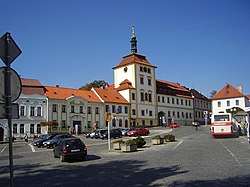Jílové u Prahy
Jílové u Prahy | |
|---|---|
 Masarykovo Square with the town hall | |
| Coordinates: 49°53′53″N 14°29′34″E / 49.89806°N 14.49278°E | |
| Country | |
| Region | Central Bohemian |
| District | Prague-West |
| First mentioned | 1310 |
| Government | |
| • Mayor | Pavel Pešek |
| Area | |
• Total | 16.25 km2 (6.27 sq mi) |
| Elevation | 381 m (1,250 ft) |
| Population (2024-01-01)[1] | |
• Total | 5,227 |
| • Density | 320/km2 (830/sq mi) |
| Time zone | UTC+1 (CET) |
| • Summer (DST) | UTC+2 (CEST) |
| Postal code | 254 01 |
| Website | www |
Jílové u Prahy (German: Eule) is a town in Prague-West District in the Central Bohemian Region of the Czech Republic. It has about 5,200 inhabitants. The historic town centre is well preserved and is protected by law as an urban monument zone.
Administrative parts
The villages of Borek, Kabáty, Luka pod Medníkem, Radlík, Studené and Žampach are administrative parts of Jílové u Prahy.
Etymology
The original form of the town's name was Jílový. The adjective jílový (from jíl, i.e. 'clay') was related to a hill at the foot of which gold was washed from the clay.[2]
Geography
Jílové u Prahy is located about 13 kilometres (8 mi) south of Prague. It lies in the Benešov Uplands. The highest point is the hill Lípový vrch at 457 m (1,499 ft) above sea level. The Sázava River forms the southern municipal border.
History
The first written mention of Jílové is from 1310. It is proved its existence in the 13th century, when it was founded by merger of gold mining settlements. In 1350, Jílové was raised to a royal town by King Charles IV. The gold mining ended in the 15th century during the Hussite Wars and some mines were flooded. The mining and importance of Jílové was partly revived by King Vladislaus II, but another decline of the town came with the Thirty Years' War.[3]
Although it was an unfavorable time for gold mining, the town began to prosper again in the 19th century. In 1897, the railway was built, and in 1900 the railway connection with Prague was finished.[3]
Demographics
|
|
| ||||||||||||||||||||||||||||||||||||||||||||||||||||||
| Source: Censuses[4][5] | ||||||||||||||||||||||||||||||||||||||||||||||||||||||||
Transport
Jílové u Prahy is located on the railway line Prague–Čerčany.[6] The D3 motorway is planned to pass near the town.
Sights

The main landmark of the historic centre is the town hall. It is a former fortress with a tower from the 14th century. It was donated to Jílové as a ruin and after it was reconstructed, the town hall was moved to the building in 1708. In 1724 the upper floor was built. In 1854 the municipality have added a side building to the tower, and in 1855 a prison.[7]
The Church of Saint Adalbert is the oldest building in the town. It was built on the site of a wooden church in the first half of the 13th century and originally dedicated to St. Nicholas. In 1567, it was damaged by a fire, and during the 17th and 18th centuries, the church was repaired and baroqued several times.[7]
Žampach viaduct is a railway arch bridge, the highest stone bridge in the country.
In popular culture
Several shots of the 1984 Oscars-awarded film Amadeus were shot in the church.[7]
Notable people
- Edward Kelley (1555–1597), English alchemist and occultist; lived here[3]
- František Chvalkovský (1885–1945), politician, diplomat, minister of foreign affairs of Czechoslovakia
Twin towns – sister cities
Jílové u Prahy is twinned with:[8]
 Holzgerlingen, Germany
Holzgerlingen, Germany Nováky, Slovakia
Nováky, Slovakia Peschici, Italy
Peschici, Italy
References
- ^ "Population of Municipalities – 1 January 2024". Czech Statistical Office. 2024-05-17.
- ^ Profous, Antonín (1949). Místní jména v Čechách II: CH–L (in Czech). p. 150.
- ^ a b c "Historie města" (in Czech). Město Jílové u Prahy. Retrieved 2021-06-23.
- ^ "Historický lexikon obcí České republiky 1869–2011" (in Czech). Czech Statistical Office. 2015-12-21.
- ^ "Population Census 2021: Population by sex". Public Database. Czech Statistical Office. 2021-03-27.
- ^ "Detail stanice Jílové u Prahy" (in Czech). České dráhy. Retrieved 2024-07-03.
- ^ a b c "Památková zóna" (in Czech). Město Jílové u Prahy. Retrieved 2021-06-23.
- ^ "Partnerská města" (in Czech). Město Jílové u Prahy. Retrieved 2020-01-24.
External links



